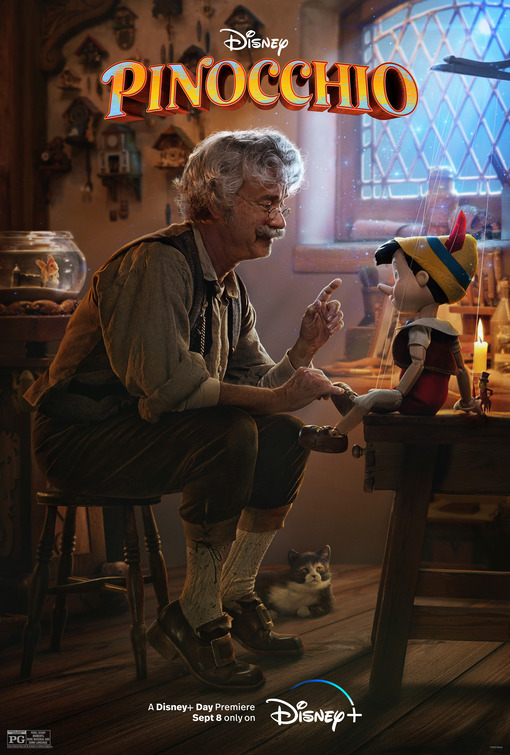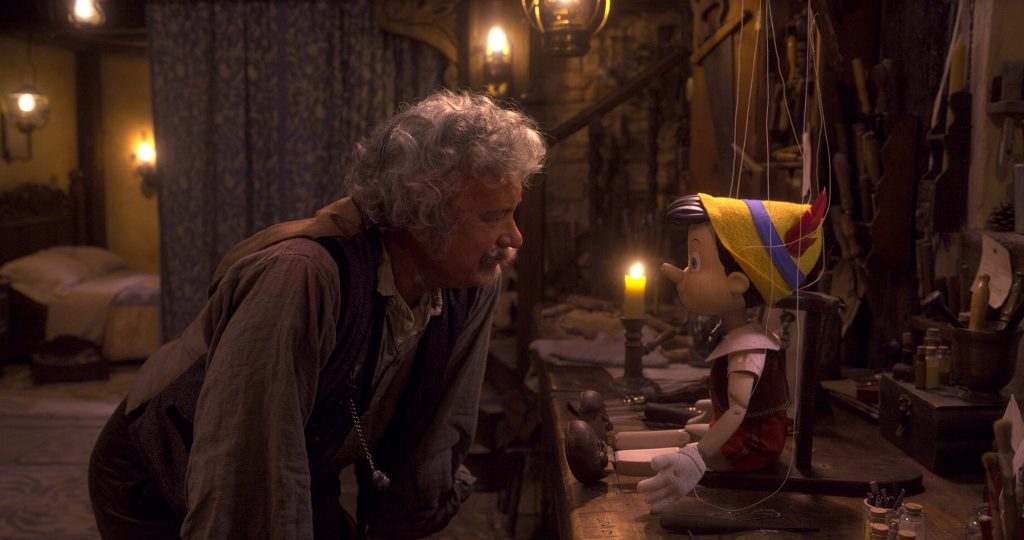
⭐⭐
Rating: 2 out of 5.Disney’s reliance on making live-action versions of their animated films really kicked into high gear during the 2010s decade. As a movie critic, I approach every remake for what it is — rather than what I think it should be. I’ve been more forgiving than most. I tolerated their critically reviled (but monetarily successful) reworkings of Alice in Wonderland, Maleficent, and The Lion King to give them mildly positive reviews. However, the first five animated releases from Walt Disney Studios represent some of the greatest ever made, so the standard is admittedly higher when replicating these classics. Snow White and the Seven Dwarfs, Pinocchio, Fantasia, Dumbo, and Bambi, are sacred. Incidentally, 2019’s Dumbo was a dreary slog. Pinocchio isn’t nearly as bad, but it’s still a hollow shell of an adventure.
To its credit, Pinnochio — adapted from a screenplay by director Robert Zemeckis and Chris Weitz — at least duplicates the basic plot of the original. The main character (voiced by Benjamin Evan Ainsworth) does look appealing too. The developments show some loyalty to the source material. Yet there is more to art than accurately recreating the scenes using CGI and human actors. The characters need to engage our emotions. There must be some joy, some spark that unites the production and makes us care. CGI is unnecessarily used to replicate everything from Geppetto’s pets Figaro and Cleo to a titan of the sea, Monstro. I get that a real whale would have been hard to tame, but why couldn’t they get an actual cat or goldfish? Tom Hanks doesn’t embody Geppetto with sincerity either. His goofily exaggerated performance reaches a zenith in one scene. Geppetto’s shock at discovering his wooden puppet can walk and talk on its own is an excessive display that would be an embarrassment coming from a first-year acting student, let alone a talent with two Oscars and over four decades of experience.
Director Robert Zemeckis makes some misguided choices. The filmmaker relies on self-referential humor, which takes you out of this movie as it promotes others. Geppetto is a wood carver that makes cuckoo clocks based on properties that Disney owns. Toy Story and Who Framed Roger Rabbit timepieces honor the studio while referencing Woody, the toy Hanks voiced and a feature that Zemekis directed. A minor quibble, but the decisions get more egregious. I get that Pinnochio is naive and there are ways to illustrate this amusingly. Showing a closeup of horse droppings that Pinnchio approaches and then sniffs is not one of them. When Pinocchio ultimately gets to Pleasure Island, it’s meant to be a decadent isle full of illegal activities like drinking beer, chewing tobacco, and smoking cigars. None of that happens. In this account, boys and girls drink root beer, eat candy, and light fireworks in a theme park. I’m sorry, but how is this sanitized depiction any different from what goes on at Disneyland every day of the year? When the children transform into donkeys, the computer rendering is garish. It’s grotesque but because the image is implausible and ridiculous — not due to its inherent scariness.
What more is there to say? Pinocchio is a redundant, soulless recreation that dutifully mimics the plot points but without the charm, wit, or spirit. I could go on, but doing so would be simply beating a dead horse…or in this case, a donkey.
09-08-22


4 Responses
Man this is really disappointing. The idea of Hanks playing Geppetto sounds wonderful — it seems a tailor-made role for him. Sounds like he might have gotten a little too excitable in the part and Zemeckis would never try to reign him in. But what grieves me is this out-of-place self-referential humor nodding obnoxiously to Disney product. This is happening in every movie now. It needs to stop (but it won’t).
You said it. Disney is just making “product” at this point. It’s been awhile since anything the studio put out was an organic work of art. It’s all calculated to check off certain boxes. If not for Marvel, Disney would be a nonentity.
Lightyear cost $200 million to make and was expected to earn 5x that amount but it barely covered costs and to earn $218 million worldwide.
This was bad. Disney, no more live action remakes. 2 ⭐️ because Pinocchio looked good.
Brace yourself. There’s several high profile remakes coming out in the next two years.